Join Our Telegram channel to stay up to date on breaking news coverage
The National Basketball Association (NBA) has intensified its push for federal regulation of sports prediction markets, urging the(CFTC) to adopt a “sports-specific regulatory framework” similar to state-level sports betting oversight.
This move comes amid growing concerns over the integrity risks posed by platforms like Kalshi, PredictIt, and Crypto.com, which allow users to trade contracts on sports outcomes without the stringent controls applied to traditional sportsbooks.
Key Highlights
- NBA has petitioned the CFTC for stricter regulation of sports prediction markets like Kalshi and PredictIt
- Prediction platforms can self-certify new betting markets without league approval, unlike state-regulated sportsbooks
- The Jontay Porter scandal highlighted vulnerability to manipulation without proper oversight systems
- Sporttrade petitioned the CFTC on April 25, 2025 to offer prediction markets nationally to compete with Kalshi
- Prediction markets generate over $300 million in monthly volume but lack mandatory suspicious activity reporting
- The CFTC faces pressure to balance innovation with protecting sports integrity and fair market competition
- NBA proposes mandatory pre-approval for new markets and a dedicated CFTC division for sports oversight
The Main Concerns Raised by the NBA
As you may expect, NBA official have come with solid arguments for their request:
1. Integrity Risks from Unregulated Markets
In a May 1, 2025 letter to CFTC Acting Chair Caroline Pham, the NBA highlighted the rapid expansion of prediction markets into single-game and speculative propositions, such as:
- Player performance (e.g., points, rebounds)
- Officiating decisions
- Injury statuses
- League rules
Unlike state-regulated sportsbooks, which require approval for new wagering markets, prediction platforms can self-certify offerings under CFTC guidelines. The NBA warned this autonomy creates a “sinkhole of legal uncertainty” and exposes leagues to unmonitored integrity threats.
2. Lack of Sports-Specific Oversight
The NBA emphasized that the CFTC lacks dedicated personnel or protocols to detect suspicious activity in sports markets. While state regulators collaborate with leagues to investigate irregularities (e.g., the Jontay Porter scandal), prediction markets operate without similar accountability.
NBA VP Alexandra Roth noted: “There is no requirement for prediction platforms to report suspicious trades or cooperate with league investigations. This gap undermines the integrity safeguards we’ve built with regulated sportsbooks.”
3. Proliferation of “Exotic” Markets
Prediction markets have evolved from season-long futures (e.g., “NBA Champion”) to granular, in-game propositions. The NBA fears platforms could soon offer micro-markets on individual player actions or referee calls, which are harder to monitor and more susceptible to manipulation.
The Jontay Porter Scandal: A Catalyst for Action
The NBA’s petition follows the lifetime ban of former Toronto Raptors center Jontay Porter in 2024 for betting violations. Porter conspired with bettors to alter his performance in games, a scheme uncovered through regulated sportsbooks’ anomaly detection systems. The scandal prompted the NBA to:
- Ban “under” prop bets for low-salaried players.
- Strengthen partnerships with regulated operators to flag suspicious activity.
The league argues that prediction markets, lacking such collaboration, could enable similar fraud undetected.
Regulatory Landscape and CFTC’s Dilemma
- Prediction Markets: Regulated federally under CFTC as “event contracts,” allowing nationwide availability without state approvals.
- Sportsbooks: Licensed at the state level, subject to strict oversight (e.g., market approvals, integrity monitoring).
Sporttrade’s Push for Expansion
Sports betting exchange Sporttrade, operational in five states, petitioned the CFTC on April 25, 2025, to offer prediction markets nationally. CEO Alex Kane argued that platforms like Kalshi enjoy an unfair advantage under current rules, creating “irreparable harm” to regulated operators.
CFTC’s Balancing Act
The CFTC faces pressure to:
- Foster Innovation: Prediction markets generate over $300 million in monthly volume (e.g., Kalshi’s March Madness markets).
- Mitigate Risks: Protect leagues from unvetted markets and ensure fair competition for state-licensed operators.
The agency canceled a February 2025 roundtable on the issue, delaying clarity on its stance.
NBA’s Proposed Solutions
The NBA urged the CFTC to:
- Establish a dedicated division for sports market oversight.
- Require pre-approval for new sports contracts, mirroring state processes.
- Mandate suspicious activity reporting and league collaboration.
- Limit “exotic” markets that heighten integrity risks.
Implications for the Gambling Industry
- Operators: Regulated sportsbooks may face increased competition if prediction markets expand unchecked.
- Leagues: The NBA’s stance could inspire similar petitions from MLB, NFL, and NCAA.
- States: Legal sports betting markets ($45 billion handle in 2024) may push back against federal overreach.
Wrapping Up
The NBA’s petition underscores the tension between innovation and integrity in the rapidly evolving U.S. gambling market, especially as crypto betting sites are on the rise. As prediction markets gain traction, the CFTC’s response will shape whether federal oversight can replicate the safeguards of state-regulated systems. With Sporttrade and Kalshi awaiting clarity, the stakes for sports leagues, operators, and regulators have never been higher.
Sources:
- NBA Letter to CFTC (May 1, 2025)
- NBA Calls For CFTC Regulatory Framework of Prediction Markets – Covers.com
- NBA Shares Its Concerns With The CFTC Over Sports Event Contracts Integrity Risks – EGR Global
- Sports Prediction Markets Roundtable Canceled By CFTC – Legal Sports Report
Join Our Telegram channel to stay up to date on breaking news coverage


